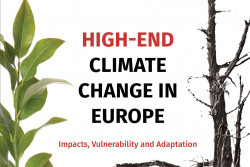Understanding Impacts and Adaptation to High-end Climate Scenarios in Europe: A Policy Booklet
While the Paris Agreement, adopted in 2015, aims at limiting global warming to well below 2°C, concerns remain that current global greenhouse gas emissions are on track to warm the climate by more than that target. In order to adapt to such high-end climate change and foster actions to avoid it, it is vital that decision-makers have access to reliable scientific information on these uncertain, but potentially high-risk, scenarios of the future. Funded by the European Union to advance understanding of the consequences of high-end climate change, involving temperature increases above 2°C, IMPRESSIONS, HELIX and RISES-AM-, have assessed climate change impacts, vulnerability and possible adaptation interventions across a range of policy sectors, in order to help decision-makers apply such knowledge within integrated response strategies. In the newly published policy booklet they describe research findings and understanding emerging on issues related to high-end climate change alongside reflections on the implications for policy and decision-making. For example, high-end climate change could have strong and lasting effects on the agriculture and consequently on food markets and food security across the globe, and also in Europe. For agriculture, as well as forestry, water and nature conservation differential impacts are projected across Europe and trade-offs may occur between them. Adaptation to high-end climate change, and decisions on actions to avoid it, require robust assessments of the associated risks that go beyond assessing individual impacts of gradual change. As sea level continue to rise, adaptation, including soft engineering and nature-based solutions, will become increasingly important for sustainable coastal management. Drawing on a very wide range of expertise from many disciplines in both the natural and social sciences, in this booklet the three projects present new understanding of the implications and risks of exceeding 2°C, as well as the challenges and opportunities of adaptation to such a warmer world, and the extent to which risks can be reduced if warming is held as close as possible to 1.5°C. To address these challenges and opportunities, societal transformation and innovative approaches in science and policy may be required. The booklet features research on impacts and adaptation relevant to a number of areas addressed by policy: food, freshwater, forestry, coastal protection, nature conservation, urban areas, human health and foreign policy. The booklet also considers cross-cutting impacts, challenges and opportunities for transformational change as a response to multiple, interacting risks. Original Source: The policy booklet is accessible to download via the joint project website: http://highendclimateresearch.eu/(opens in new window) Additional information: IMPRESSIONS - IMPacts and REsponses from high-end Scenarios: Strategies for Innovative SolutiONS(opens in new window) aims at advancing understanding of the consequences of high-end climate change and helping European decision-makers apply this knowledge within integrated adaptation and mitigation strategies. HELIX - High-End cLimate Impacts and eXtreme(opens in new window) is providing a set of credible, coherent, global and regional views of different worlds at 1.5°C, 2°C, 4°C and 6°C to make adaptation to our changing climate more understandable and manageable. RISES-AM- http://www.risesam.eu/ - (Responses to coastal climate change: Innovative Strategies for high-End Scenarios - Adaptation and Mitigation), deals with adaptation deficits to marine climate factors (sea-level rise and storminess) affecting world's coasts, where adaptation/mitigation and economic development may become intertwined issues for high end conditions.
Keywords
Countries
Austria, Belgium, Bulgaria, Cyprus, Czechia, Germany, Denmark, Estonia, Greece, Spain, Finland, France, Croatia, Hungary, Ireland, Lithuania, Latvia, Malta, Netherlands, Poland, Portugal, Romania, Sweden, Slovenia, Slovakia, United Kingdom



